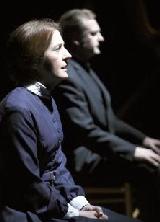SEARCH
REVIEWS
FEATURES
NEWS
Etcetera and
Short Term Listings
LISTINGS
Broadway
Off-Broadway
NYC Restaurants
BOOKS and CDs
OTHER PLACES
Berkshires
London
California
DC
Philadelphia
Elsewhere
QUOTES
On TKTS
PLAYWRIGHTS' ALBUMS
LETTERS TO EDITOR
FILM
LINKS
MISCELLANEOUS
Free Updates
Masthead
Writing for Us
A CurtainUp  London Review
London Review
 London Review
London ReviewThe Sugar Wife
|
Marriage is like lying in a warm bath. And slowly it gets colder and colder for the rest of one's lifetime.
---- Alfred Darby |

Jane Brennan as Hannah with Barry Barnes as Samuel in the background
(Photo: Manuel Harlan) |
The childless Hannah Tewkley (Jane Brennan) devotes herself to work with the poor of the city while her husband Samuel (Barry Barnes) tends to a thriving business dealing in tea, coffee and sugar. The basic dichotomy of the play is how dependent these otherwise good people are for their material prosperity on the enslavement of others. They have house visitors, a descendant of Abraham Darby the famous Yorkshire Ironmaster who is Alfred Darby (Robert Price) and his protegee Sarah Worth (Susan Salmon), a former slave from Georgia USA. Sarah, who was freed when Alfred bought her at an auction, is on a lecture tour in the British Isles to inform people about the atrocities of the trade in human cargo.
Kuti's play is not just about the economic dependence of all on the slave trade but at a personal level it is also about passion and hypocrisy and Victorian sleaze. Much of the humour comes from Martha (Sarah-Jane Drummey), a prostitute with syphilis, who dreams of joining her sister in America. Her candidly observant interaction with Hannah is a highlight of the play. Sarah Worth's lecture inserts are also moving and graphic as she describes life as a slave to an audience of abolitionists.
Against the current trend for refining the interior décor of one's house, the Tewkleys have systematically gone against the Victorian tradition and converted their house back to the plainness of Shaker furniture having taken away the velvet, twisted bannisters, fancy panelling and gilded looking glass of the house they moved into. What they have expensively created is described as "a life of opulent plainness". "How do you live in your mansion built on sugar and tea leaves?" asks Alfred of Hannah. The set confirms this simplicity with wonderful lighting from below of the plain floorboards giving stripes of shade and light, plus candle light and a backdrop of twenty four plain drawers out of which the cast mysteriously take hats and put away flower vases. A harpist plays by the side of the stage but while the music is pretty her presence appears somewhat of a cliché, obviously telling us when to react emotionally to the script.
The play juxtaposes personal morality, religion and the ethics of business in an interesting way. The men and their photographic interests remind us as to who were the customers of those twentieth century prostitutes. We never see Alfred's photographs of Sarah but from Samuel's reaction to them it is clear that they are erotic.
The performances are convincing. I particularly liked Martha's humour but I found. Jane Brennan's very sober Quaker wife's dalliance with Alfred less plausible. Both she and Sarah are women bound to their men. Hannah is tied to her husband financially and as she thinks about leaving him for Alfred, Sarah makes it clear what her life would be with no money and makes the case for her to stay with her husband so that the ex-slave becomes an apologist for Samuel, the businessman who buys from slave plantations -- or is she just defending her own interests? Even when The Sugar Wife slows in parts it's clear that overall there is plenty to discuss and think about.
|
THE SUGAR WIFE
Written by Elizabeth Kuti Directed by Lynne Parker With: Barry Barnes, Sarah-Jane Drummey, Robert Price, Susan Salmon, Jane Brennan Set Design and Lighting : Paul Keogan Costume: Joan O'Clery Music composed by: Ellen Cranitch Running time: Two hours 20 minutes with one interval Box Office: 0870 429 6883 Booking to 11th February 2006 Reviewed by Lizzie Loveridge based on 13th January 2006 performance at the Soho Theatre, Dean Street, London W1 (Tube: Tottenham Court Road) |





